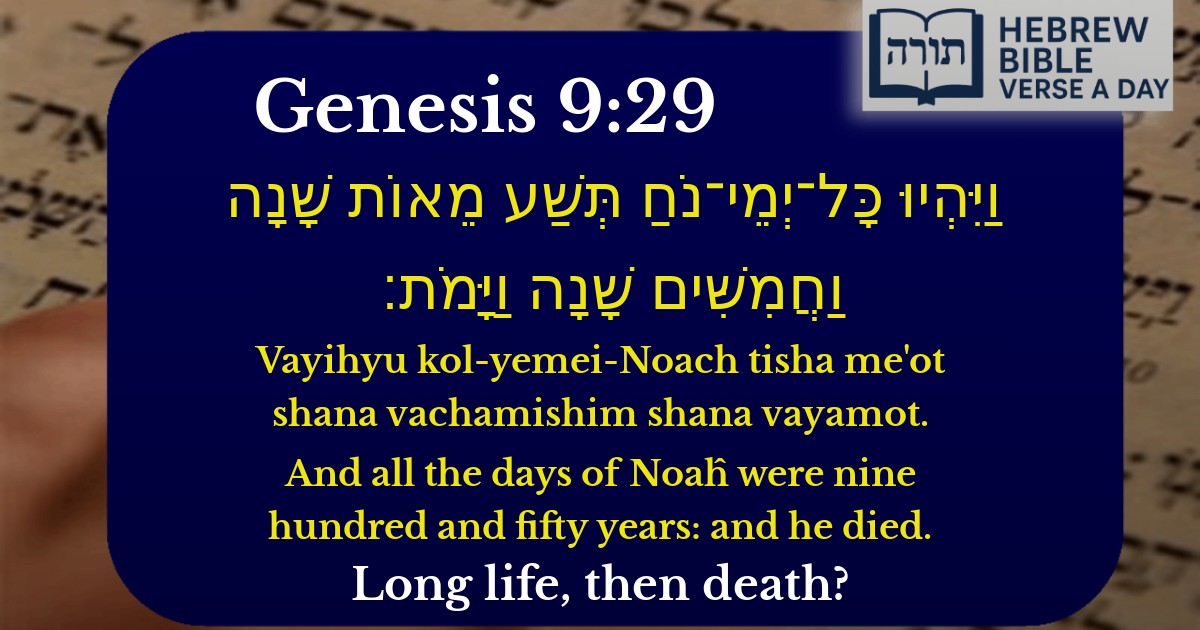Join Our Newsletter To Be Informed When New Videos Are Posted
Join the thousands of fellow Studends who rely on our videos to learn how to read the bible in Hebrew for free!
Hebrew Text
וַיִּהְיוּ כָּל־יְמֵי־נֹחַ תְּשַׁע מֵאוֹת שָׁנָה וַחֲמִשִּׁים שָׁנָה וַיָּמֹת׃
English Translation
And all the days of Noaĥ were nine hundred and fifty years: and he died.
Transliteration
Vayihyu kol-yemei-Noach tisha me'ot shana vachamishim shana vayamot.
Hebrew Leining Text
וַיִּֽהְיוּ֙<sup class="footnote-marker">*</sup><i class="footnote">(בספרי ספרד ואשכנז וַֽיְהִי֙)</i> כׇּל־יְמֵי־נֹ֔חַ תְּשַׁ֤ע מֵאוֹת֙ שָׁנָ֔ה וַחֲמִשִּׁ֖ים שָׁנָ֑ה וַיָּמֹֽת׃ <span class="mam-spi-pe">{פ}</span><br>
וַיִּֽהְיוּ֙*(בספרי ספרד ואשכנז וַֽיְהִי֙) כׇּל־יְמֵי־נֹ֔חַ תְּשַׁ֤ע מֵאוֹת֙ שָׁנָ֔ה וַחֲמִשִּׁ֖ים שָׁנָ֑ה וַיָּמֹֽת׃ {פ}
🎵 Listen to leining
Parasha Commentary
📚 Talmud Citations
This verse is quoted in the Talmud.
📖 Sanhedrin 108b
The verse is referenced in a discussion about the lifespan of Noah and the generations before the flood.
📖 Zevachim 113b
Mentioned in the context of discussing the longevity of early biblical figures.


The Lifespan of Noach
The verse states: "And all the days of Noach were nine hundred and fifty years: and he died." (Bereishit 9:29). This concludes the account of Noach's life, which spanned nearly a millennium. The Torah emphasizes his lifespan to contrast the generations before and after the Mabul (Flood).
Rashi's Explanation
Rashi (Bereishit 9:29) notes that Noach lived fewer years than his ancestors (e.g., Adam, Shet, and Metushelach, who lived over 900 years). He explains that the Flood weakened Noach's vitality, as the verse states, "For the earth is filled with violence because of them" (Bereishit 6:13), implying that the corruption of the world affected even the righteous Noach.
Rambam on Longevity
Rambam (Moreh Nevuchim 2:47) discusses the extended lifespans of early generations, suggesting that before the Flood, human physiology and the natural world were fundamentally different. The post-Flood era introduced changes in climate and sustenance, leading to shorter lifespans.
Midrashic Insights
Kabbalistic Perspective
The Zohar (Bereishit 59a) teaches that Noach's years correspond to divine providence—his 950 years reflect the 9.5 centuries of divine patience before the Flood. His death marks the transition to a new era under the covenant with Avraham.